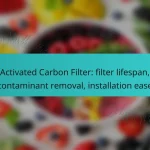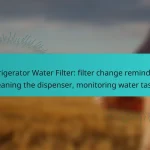A whole house filter provides essential protection for your plumbing while significantly reducing contaminants in your water supply. By treating all the water entering your home, these systems ensure that every tap delivers cleaner, healthier water, ultimately enhancing both your well-being and the lifespan of your appliances.

What are the benefits of a whole house filter in the UK?
A whole house filter in the UK offers significant advantages, including protection for plumbing, reduction of contaminants, and improved water quality. These systems ensure that every tap in your home delivers cleaner water, enhancing both health and appliance longevity.
Protects plumbing from scale and corrosion
A whole house filter helps prevent scale buildup and corrosion in your plumbing system. Hard water, which is common in many areas of the UK, contains minerals that can lead to limescale deposits, damaging pipes and reducing water flow.
By filtering out these minerals, a whole house system can extend the life of your plumbing and reduce maintenance costs. Regularly replacing filter cartridges is essential to maintain this protection.
Reduces harmful contaminants in drinking water
Whole house filters effectively reduce harmful contaminants such as chlorine, lead, and sediment from your drinking water. These systems typically use multiple filtration stages to ensure that various pollutants are removed, providing safer water for consumption.
In the UK, many households benefit from filters that meet national water quality standards, ensuring that the water is not only clean but also safe for everyday use.
Improves water taste and odor
Filtering your water can significantly enhance its taste and odor. Many people find that chlorine and other chemicals used in municipal water treatment can create unpleasant flavors and smells.
A whole house filter removes these impurities, resulting in fresher, cleaner-tasting water straight from the tap. This improvement can encourage more water consumption, promoting better hydration.
Increases appliance lifespan
By reducing scale and sediment, a whole house filter can increase the lifespan of appliances such as dishwashers, washing machines, and water heaters. These appliances often suffer from mineral buildup that can lead to inefficiency and costly repairs.
Investing in a filtration system can save money in the long run by minimizing appliance maintenance and replacement costs.
Enhances overall water quality
The overall water quality in your home is significantly improved with a whole house filter. These systems not only provide cleaner water but also help maintain a consistent quality throughout your home.
With better water quality, you can enjoy peace of mind knowing that your family is using water that is free from harmful contaminants and unpleasant tastes or odors. Regular maintenance and timely filter changes are key to sustaining these benefits.

How does a whole house filter work?
A whole house filter works by treating all the water entering a home, ensuring that contaminants are removed before they reach taps and appliances. This system provides comprehensive coverage, protecting plumbing and enhancing water quality throughout the household.
Uses multiple filtration stages
Whole house filters typically employ multiple filtration stages to effectively remove a variety of contaminants. These stages may include sediment filters, carbon filters, and sometimes additional technologies like UV purification.
Each stage targets specific impurities, allowing for a more thorough cleaning process. For instance, sediment filters capture larger particles, while carbon filters address chemicals and odors.
Removes sediments and chemicals
One of the primary functions of a whole house filter is to remove sediments and harmful chemicals from the water supply. Sediment filters can eliminate dirt, rust, and sand, which can accumulate in pipes and appliances over time.
Additionally, chemical contaminants such as chlorine, lead, and volatile organic compounds (VOCs) are effectively reduced, improving both the safety and taste of the water. This is particularly important in areas where water quality may not meet health standards.
Utilizes activated carbon and reverse osmosis
Activated carbon is a key component in many whole house filtration systems, known for its ability to absorb a wide range of chemicals and impurities. This method is effective for reducing chlorine and improving taste and odor.
Some systems also incorporate reverse osmosis, which forces water through a semi-permeable membrane to remove even smaller contaminants. This dual approach ensures that water is not only cleaner but also safer for drinking and household use.

What are the costs associated with whole house filters in the UK?
The costs of whole house filters in the UK can vary significantly based on the system’s type, installation complexity, and ongoing maintenance needs. Homeowners should budget for initial purchase, installation, and regular maintenance to ensure optimal performance and longevity.
Initial purchase price ranges
The initial purchase price for whole house filters in the UK typically ranges from £200 to £1,500. Basic systems may be available at the lower end, while advanced models with multiple stages of filtration or specialized features can reach the higher end of this range. It’s essential to consider the specific contaminants in your water supply when selecting a filter.
Installation costs in major cities
Installation costs for whole house filters can vary by location, with major cities like London, Manchester, and Birmingham generally seeing higher rates. Homeowners can expect to pay between £300 and £800 for professional installation, depending on the complexity of the plumbing and any additional modifications needed. Always obtain multiple quotes to ensure competitive pricing.
Maintenance and replacement filter expenses
Ongoing maintenance for whole house filters includes regular inspections and the replacement of filter cartridges. Replacement filters typically cost between £50 and £150, depending on the type and brand. It’s advisable to replace filters every 6 to 12 months to maintain water quality and system efficiency.

How to choose the right whole house filter?
Choosing the right whole house filter involves understanding your water quality, the system’s flow rate, and the reliability of the brand. A well-selected filter will effectively reduce contaminants while protecting your plumbing and appliances.
Assess water quality and contaminants
Start by testing your water to identify specific contaminants such as chlorine, lead, sediment, or bacteria. Many local health departments offer testing kits, or you can purchase one online. Understanding the quality of your water helps in selecting a filter that targets the right impurities.
For instance, if your water has high sediment levels, a sediment filter would be essential. Conversely, if you’re concerned about chemical contaminants, consider a filter with activated carbon or reverse osmosis capabilities.
Consider flow rate and capacity
The flow rate of a whole house filter is crucial as it determines how much water can be filtered at once. Most households require a flow rate between 5 to 15 gallons per minute (GPM) to meet daily needs without interruptions.
Additionally, consider the filter’s capacity, which indicates how long it can operate before needing replacement. A higher capacity filter may be more cost-effective in the long run, especially for larger families or homes with high water usage.
Evaluate brand reliability and reviews
Researching brand reliability is essential when selecting a whole house filter. Look for brands with a strong reputation for quality and customer service. Online reviews can provide insights into user experiences and the effectiveness of specific models.
Check for certifications from organizations like NSF International, which ensure that filters meet specific safety and performance standards. A well-reviewed filter from a reputable brand can offer peace of mind and long-term satisfaction.

What are the common types of whole house filters?
Whole house filters typically include several types, each designed to address specific contaminants and improve water quality throughout the home. The most common types are carbon filters, sediment filters, and reverse osmosis systems, each offering unique benefits and considerations.
Carbon filters
Carbon filters are widely used in whole house filtration systems due to their effectiveness in removing chlorine, volatile organic compounds (VOCs), and other chemicals that can affect water taste and odor. They work by adsorbing contaminants onto the surface of activated carbon, providing cleaner water for all household uses.
When selecting a carbon filter, consider the filter’s capacity and the specific contaminants you wish to target. Some carbon filters may also include additional stages for enhanced filtration, such as sediment pre-filters or post-filters to further improve water quality.
Regular maintenance is crucial for carbon filters, as they can become saturated over time. It’s advisable to replace the carbon media every 6 to 12 months, depending on water usage and quality, to ensure optimal performance.


